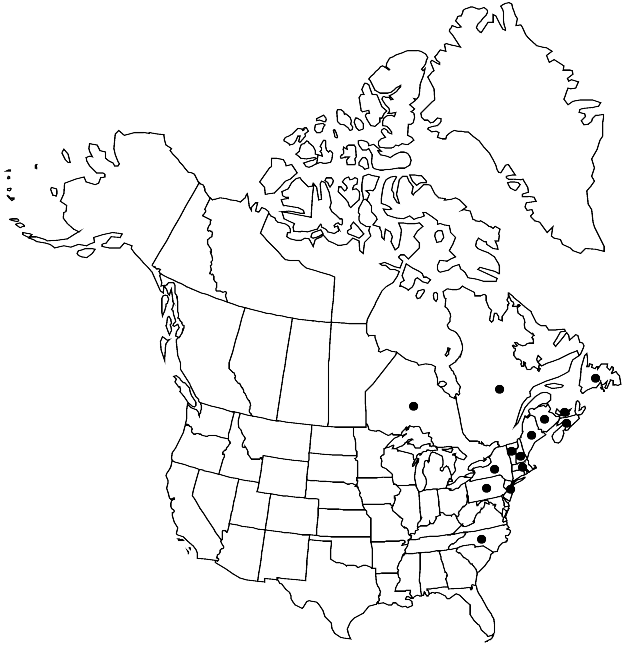Difference between revisions of "Leucodon andrewsianus"
Bryologist 100: 92. 1997.
FNA>Volume Importer |
FNA>Volume Importer |
||
| Line 29: | Line 29: | ||
|elevation=low to moderate elevations (0-1500 m) | |elevation=low to moderate elevations (0-1500 m) | ||
|distribution=N.B.;Nfld. and Labr. (Nfld.);N.S.;Ont.;P.E.I.;Que.;Maine;Mass.;N.H.;N.J.;N.Y.;N.C.;Pa.;Vt. | |distribution=N.B.;Nfld. and Labr. (Nfld.);N.S.;Ont.;P.E.I.;Que.;Maine;Mass.;N.H.;N.J.;N.Y.;N.C.;Pa.;Vt. | ||
| − | |discussion=<p>Leucodon andrewsianus differs from the similar, slightly more robust L. brachypus most evidently in the common presence of tufts of tiny branchlets congested in axils of distal leaves and at branch apices; in some specimens of L. andrewsianus, the branch apices and entire older plants transition into branchlets. The branchlets are mostly very short but sometimes much elongated. In the absence of branchlets, the slender, elongate (35–60 µm) terminal cells of young leaves are helpful for identification of L. andrewsianus. Sporophytes of L. andrewsianus are unknown, and gametangia are extremely rare. Reproduction and dispersion are doubtless accomplished by the caducous branchlets. This taxon has been treated in the flora area as L. sciuroides (Hedwig) Schwägrichen, a moss that occurs in Africa, Asia, and Europe, but apparently not in North America.</p> | + | |discussion=<p><i>Leucodon andrewsianus</i> differs from the similar, slightly more robust <i>L. brachypus</i> most evidently in the common presence of tufts of tiny branchlets congested in axils of distal leaves and at branch apices; in some specimens of <i>L. andrewsianus</i>, the branch apices and entire older plants transition into branchlets. The branchlets are mostly very short but sometimes much elongated. In the absence of branchlets, the slender, elongate (35–60 µm) terminal cells of young leaves are helpful for identification of <i>L. andrewsianus</i>. Sporophytes of <i>L. andrewsianus</i> are unknown, and gametangia are extremely rare. Reproduction and dispersion are doubtless accomplished by the caducous branchlets. This taxon has been treated in the flora area as L. sciuroides (Hedwig) Schwägrichen, a moss that occurs in Africa, Asia, and Europe, but apparently not in North America.</p> |
|tables= | |tables= | ||
|references= | |references= | ||
| Line 52: | Line 52: | ||
|publication year=1997 | |publication year=1997 | ||
|special status=Endemic | |special status=Endemic | ||
| − | |source xml=https://jpend@bitbucket.org/aafc-mbb/fna-data-curation.git/src/ | + | |source xml=https://jpend@bitbucket.org/aafc-mbb/fna-data-curation.git/src/8f726806613d60c220dc4493de13607dd3150896/coarse_grained_fna_xml/V28/V28_933.xml |
|genus=Leucodon | |genus=Leucodon | ||
|species=Leucodon andrewsianus | |species=Leucodon andrewsianus | ||
Revision as of 18:09, 18 September 2019
Plants medium-sized or rarely large, dull or glossy. Stems elongate, curved or rarely straight, not julaceous, conspicuous clusters of short, fragile branchlets present in distal leaf axils and at branch apices, sometimes scarce or apparently absent. Branch leaves erect-appressed or rarely secund, plicate, 1.4–1.9 mm; apex lanceolate-acuminate; apical laminal cells smooth abaxially or rarely papillose; terminal cell narrowly elongate, hyaline. Perigonia unknown. Perichaetia extremely rare. Sporophytes unknown.
Habitat: Tree trunks, rock, forests
Elevation: low to moderate elevations (0-1500 m)
Distribution

N.B., Nfld. and Labr. (Nfld.), N.S., Ont., P.E.I., Que., Maine, Mass., N.H., N.J., N.Y., N.C., Pa., Vt.
Discussion
Leucodon andrewsianus differs from the similar, slightly more robust L. brachypus most evidently in the common presence of tufts of tiny branchlets congested in axils of distal leaves and at branch apices; in some specimens of L. andrewsianus, the branch apices and entire older plants transition into branchlets. The branchlets are mostly very short but sometimes much elongated. In the absence of branchlets, the slender, elongate (35–60 µm) terminal cells of young leaves are helpful for identification of L. andrewsianus. Sporophytes of L. andrewsianus are unknown, and gametangia are extremely rare. Reproduction and dispersion are doubtless accomplished by the caducous branchlets. This taxon has been treated in the flora area as L. sciuroides (Hedwig) Schwägrichen, a moss that occurs in Africa, Asia, and Europe, but apparently not in North America.
Selected References
None.